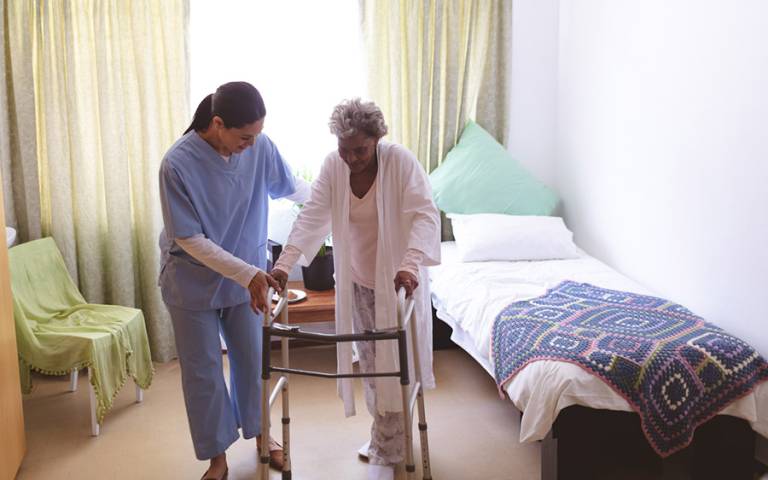Care home network aims to reduce infections
30 October 2023
A new pilot scheme to monitor infections in care homes across England is being co-led by UCL researchers.

The VIVALDI Social Care project, commissioned by the UK Health Security Agency (UKHSA) and carried out in collaboration with The Outstanding Society, Care England, and NHS England, will work with over 500 care homes in England to monitor infections such as Covid-19, flu, norovirus, and urinary tract infections, and analyse the resultant anonymised data to help reduce the impact of infections and outbreaks in care homes for older adults.
The pilot follows the VIVALDI study on Covid-19 in care homes which played a crucial role during the pandemic. It helped inform decisions on limiting staff movement between care homes to reduce infection risk and highlighted the need for sick pay for care home workers.
Principal investigator Professor Laura Shallcross (UCL Institute of Health Informatics), who also led the earlier VIVALDI study, said: “The VIVALDI Social Care project is a fantastic opportunity for researchers, residents, relatives, staff, and care providers to work together to tackle the problem of infections and outbreaks in care homes.
“By learning lessons from the Covid-19 pandemic, we aim to find new, better ways to protect residents that do not impact negatively on their quality of life.”
The pilot study will be underpinned by a data platform co-designed with people who live and work in care homes. It will connect lists of care home residents with routine datasets already held by the NHS, including hospital admissions, mortality data, immunisations, laboratory test results, and prescriptions, all using a common pseudo-identifier based on NHS numbers.
This integrated approach will provide a comprehensive view of residents’ health and healthcare interactions.
In the earlier VIVALDI study, also commissioned by UKHSA, researchers looked at the impact of Covid-19 in care homes, what could be done to prevent the spread of infection, and the effectiveness of the Covid-19 vaccination.
This study and regular asymptomatic testing for Covid-19 helped to address the gap in care home data infrastructure which left care homes for older adults vulnerable to infections and outbreaks at the start of the pandemic.
The VIVALDI survey was established in May 2020 to measure the burden of Covid-19 infections in care home staff and residents and understand why some homes were experiencing outbreaks. This included swab testing through the national care home testing programme and surveys completed by care home managers.
The main VIVALDI study started in June 2020 and built on the findings of the VIVALDI survey by linking routinely collected data from staff and residents in over 300 care homes in England. This data included vaccination records, hospital visits, and death records. Blood samples were also taken to study infection rates, immunity, and other factors in long-term care facilities.
Professor Steven Riley, Director General of Data, Analytics and Surveillance at the UK Health Security Agency, said: “The UKHSA’s collaboration with UCL on the VIVALDI study helped us understand the impact Covid-19 had in care homes and fed directly into important policy making decisions, helping to protect those living and working in adult social care settings during the pandemic.
“We are delighted to be able to continue this work by funding the VIVALDI Social Care pilot which will improve our understanding of infections in care homes and similar environments beyond Covid-19 and will provide valuable data that will contribute to our mission to prepare for, prevent and respond to health threats, protect livelihoods and, most importantly, save lives.”
Zoe Fry, Director of The Outstanding Society, said: “The Board of Directors at the Outstanding Society is thrilled to announce following 18 months of collaborative working, VIVALDI Social Care has secured national funding to support a pilot programme.
“This programme will work to enhance the well-being of individuals residing or working in care homes for older people throughout England as well as supporting the wellbeing of visitors to the homes.
“This initiative seeks to investigate strategies for minimising infections and enhancing the overall quality of life within these care settings. The collection of data plays a pivotal role in driving positive transformation within the sector, reflecting our commitment to research led by social care, for social care.”
Professor Martin Green, Chief Executive of Care England: “The funding that VIVALDI Social Care has received is a recognition of the necessary work the project is looking to conduct. It will enable residents, families, care workers, providers, and wider stakeholders to work together and develop our understanding of how to reduce the impact of infections and outbreaks in care homes.
“Research in our sector is vital to help influence government policy and deliver improved outcomes for people who live in, work in, and visit social care. VIVALDI Social Care brings the sector together to improve learning and lays a strong foundation for other studies to shape social care through research going forward.”
Links
- UKHSA
- Professor Laura Shallcross’s academic profile
- VIVALDI study
- UCL Institute of Health Informatics
- UCL Population Health Sciences
- The Outstanding Society
- Care England
- NHS England
Image
- Credit: iStock / Wavebreakmedia
Media contact
Mark Greaves
E: m.greaves [at] ucl.ac.uk
 Close
Close

